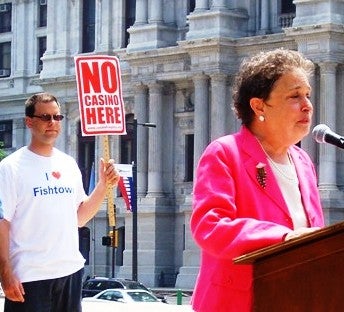Stakes raised in riparian rights fight

State Rep. Babette Josephs
Nov. 13
By Kellie Patrick Gates
For PlanPhilly
With the future of at least one proposed casino resting on whether it can be built on state-owned riverfront land, Pennsylvania leaders are uncertain about who has the right to grant that permission.
Thursday, SugarHouse Casino operators will ask the Philadelphia Commerce Department to grant them riparian rights.
In December, the House of Representative’s State Government Committee will hold a hearing to determine whether the Commerce Department should even have a say.
Riparian land leases are normally granted by the state, via an act of the legislature. But this route has proven rough sailing for SugarHouse. Legislative tradition maintains that only someone representing the district that contains the land can introduce a bill to grant riparian rights. Neither State Sen. Vincent Fumo nor State Rep. Michael O’Brien are willing to do that without consent of the neighborhood associations – and most of the associations are fighting the casinos’ proposed locations.
But SugarHouse operators believe they have found a way around this roadblock. Last month, the casino’s attorneys found a 1907 state law that they say gives the Commerce Department the right to grant riparian rights.
Attorneys who will make SugarHouse’s case Thursday could not be reached for comment, but spokeswoman Leigh Whittaker released this statement:
“Our analysis and the City’s analysis indicate that we meet the requirements under the law,” she wrote in an email. “We are confident that the City has the authority to issue HSP Gaming the license it has requested and we look forward to building a world class facility that includes public access to the waterfront.”
City Solicitor Romulo L. Diaz Jr. has said his reading of the law backed the casino’s assertion.
Diaz believes the law grants the city the power to give SugarHouse riparian rights. When told O’Brien does not think the law applies in this particular case, he said: ” I’m not going to try to argue the merits with non-lawyers. I’m comfortable that the legal basis for the hearing to proceed tomorrow is clear, and I intend to address the issue, during the hearing, of the Commerce Director’s authority under various state statutes.”
Diaz said he will speak only to whether the Director holds the power to grant riparian rights. “There will be various administration witnesses. It’s my expectation there will be a witness who will talk about whether this is consistent with the mayor’s vision, a witness who will address the issue of consistency and compatibility with (SugarHouse’s) plan of development approved by the planning commission, and a witness from the perspective of the engineering and safety aspects of the application.”
And Governor Ed Rendell – long a strong proponent of bringing legalized gambling to the city – said the Commerce Department should hear the case.
“I support this application process, given the importance of gaming revenues from this facility to reducing city wage taxes and expanding the Convention Center,” he said in a press statement.
The governor’s words did not sit well with Philadelphia Rep. Babette Josephs, the majority chair of the State Government Committee. She wrote the governor: “The city of Philadelphia is essentially beginning a process to overstep the authority solely granted to the legislature to grant riparian rights …. I strongly urge your support against what I believe is a calculated misreading of state law that will most assuredly be met with a legal challenge.”
Josephs asked the governor to answer some questions before her committee met Tuesday. She wanted to know if he believed the city “can license state lands for private use and the construction of a permanent structure for a licensed gaming facility” and whether it is “the city of Philadelphia or the Commonwealth of Pennsylvania that has the legal authority to grant riparian rights to the SugarHouse Casino.”
Tuesday morning, Josephs received a reply dated Nov. 9 and written by James P. Creedon, secretary of the Department of General Services, on behalf of the governor.
Creedon did not directly answer Josephs’ questions about where the power to grant use of riparian lands lies. He said that both SugarHouse and the city believe the city has the right. “Ultimately, whether Sugarhouse and the City are correct may be decided through legal proceedings,” Creedon wrote. “Today, however, the Governor supports the SugarHouse application if it will expedite the development of the project.”
Unsatisfied with those answers, Josephs’ committee voted today to hold a hearing to determine just where the power to grant riparian rights lies and look at other riparian rights issues that committee members say remain foggy, including the state’s definition of riparian land.
“Only the general assembly can lease riparian rights to these casinos – to anyone who wants riparian rights – not local government,” said Rodney Oliver, majority executive director of the House State Government Committee. “We believe the administration and the governor know this. And we’re not going to sit idly by.”
The hearing will likely be held the first week of December, Oliver said. At that hearing, the committee will also examine the way Pennsylvania defines riparian land “to make sure the citizens of the commonwealth are being adequately compensated for the value of riparian rights.”
The state took 14 months to determine how to ensure the state was adequately compensated for riparian rights. The governor called a moratorium on issuing these rights, in fact, until the study was completed. Previously, the state charged very little for this land, which in Philadelphia has become quite valuable. Leases were commonly granted at the rate of $1 for 99 years.
In June, the Department of General Services announced a new rate structure: $5 per square foot. At the time, DGS estimated that SugarHouse would pay roughly $2 million for a 99-year lease.
But Rep. O’Brien, a member of the committee, thinks the state could get more money if it defined riparian rights differently. He wants to know why the state defines riparian rights as the land between the pier head – the boundary of the shipping channel – to the bulkhead or the place on shore where a bulkhead would be. O’Brien wonders why the state doesn’t define riparian lands with the standard definition used in Black’s Law Dictionary: The land that is covered by water during high tide but exposed during low tide.
O’Brien will also attend Thursday’s Commerce Department hearing. He will argue that the law gives the Commerce Department the power to grant riparian rights only for public projects related to water-born commerce, such as a pier, wharf or harbor structure, he said. The casinos have nothing to do with water-born commerce and are private projects, he said.
Some of the land the casino wants to use is dry. Over time, the space between former city piers has been filled in. But O’Brien said the Commerce Department does not have the right to grant the use of the infill to anyone.
O’Brien will also point to a city ordinance, 18-100. “It says you’ve got to go to L&I first and get your permit before you can go to the Commerce Director,” he said. But the city has yet to create a Commercial Entertainment District – a place where zoning would allow casino operation. “L&I can’t issue the permit, because City Council cannot pass the CED, so this hearing is fatally flawed and premature,” O’Brien said.
The public hearing is slated for 2 p.m. Thursday at the Convention Center. Those wishing to testify should arrive at 1 p.m. to sign up.
Kellie Patrick Gates is a former Philadelphia Inquirer reporter. Contact her at kelliespatrick@gmail.com
WHYY is your source for fact-based, in-depth journalism and information. As a nonprofit organization, we rely on financial support from readers like you. Please give today.






